Expert on China’s Foreign Policy: Beijing Colludes with 'Israel'—Not a True Ally to Iran
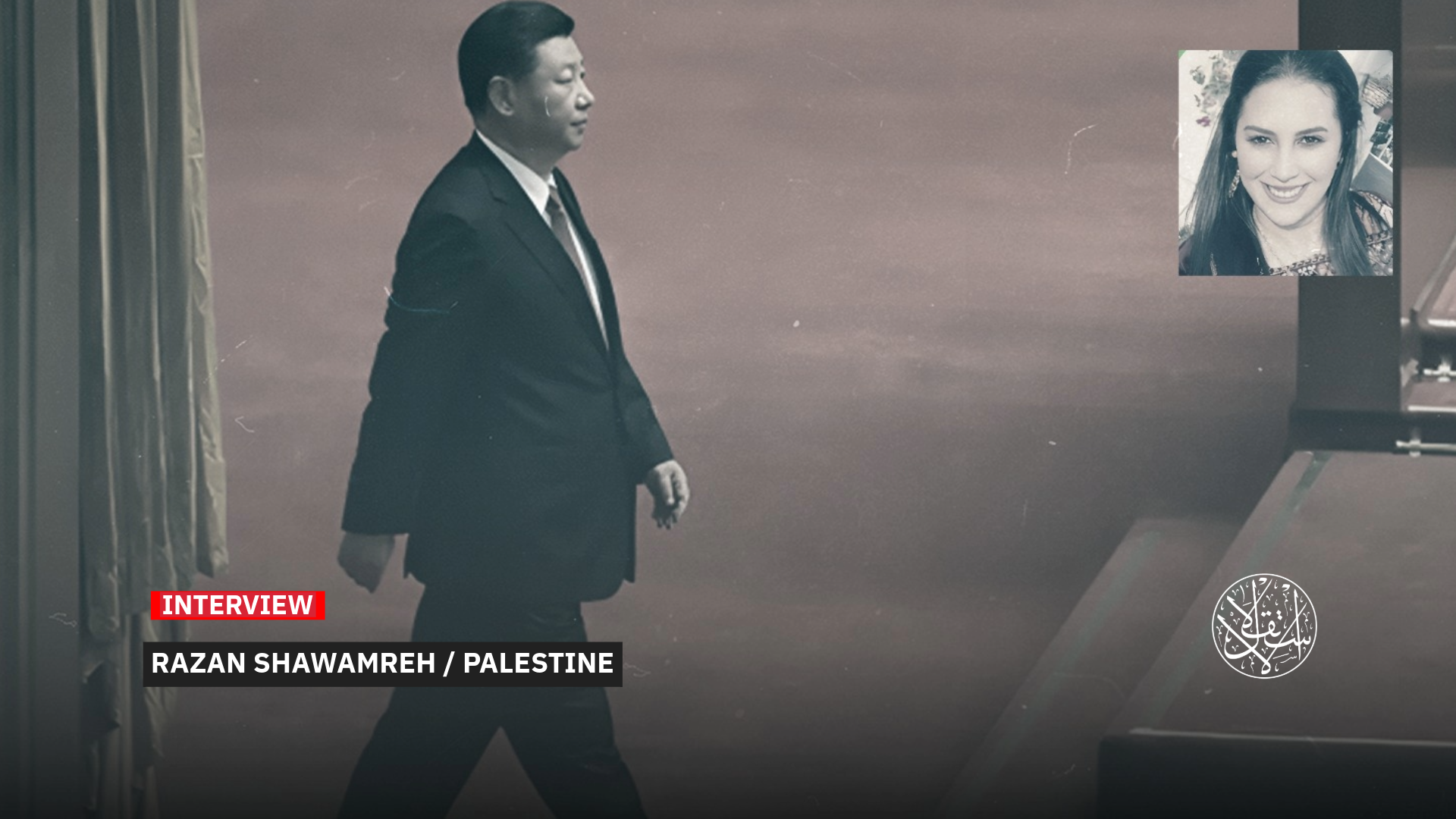
“China portrays itself as a neutral player in our region’s conflicts, but that claim remains doubtful.”
China isn’t the neutral actor it claims to be in Middle East affairs, says Razan Shawamreh, an expert in international relations and Chinese foreign policy. Instead, she describes Beijing’s stance—especially on the Palestinian issue—as one of “selective neutrality.”
In an interview with Al-Estiklal, Shawamreh said despite its public declarations, China carefully avoids crossing the red lines drawn by the U.S. and European powers in the region.
She delved into the broader context of China’s growing presence in the Middle East, unpacking its foreign policy philosophy and its positioning on key regional conflicts.
Shawamreh also examined China’s complex ties with both the Israeli Occupation and Iran, pointing to a clear gap between its official discourse and its actions on the ground.
“There’s no real alliance between China and Iran,” she said, suggesting that this “disconnect helps explain Tehran’s disappointment with Beijing during the latest round of military tensions with Israel.”
Razan Shawamreh is a Palestinian academic with a PhD in international relations and a specialization in Chinese studies. Her work focuses on China’s evolving role in the Middle East and North Africa, with particular attention to its policies toward Zionism, the Arab world, Iran, and Turkiye.
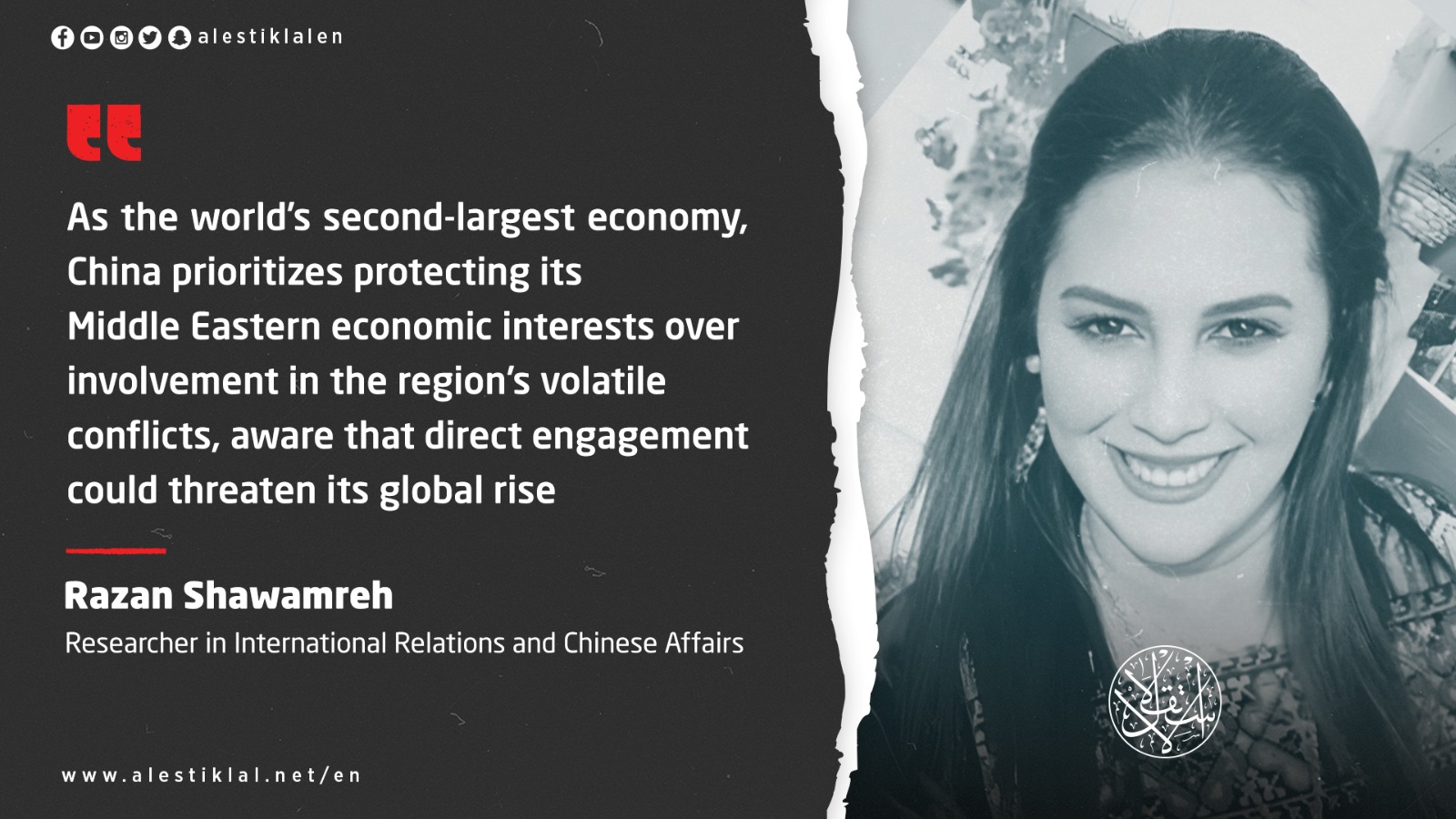
Understanding China
How does China define its diplomatic role in the region? Is it a neutral mediator or just an economic powerhouse?
China is the world’s second-largest economy, and protecting its economic interests in the Middle East far outweighs any desire to get entangled in the region’s volatile conflicts. Beijing knows well that the Middle East has historically been a graveyard for great powers, and any direct involvement could derail its global rise.
That’s why China largely avoids political intervention—even if countries aligned with its interests, like Iran, were to collapse. Beijing is highly adaptable to change but prefers not to drive or shape it.
Interestingly, China’s strongest and most stable relationships in the region are not with America’s adversaries, but with its allies—particularly Egypt, the UAE, and Saudi Arabia. For example, its energy ties with Saudi Arabia have grown steadily, while Chinese firms have pulled out of many energy projects in Iran, largely due to U.S. sanctions that have made it difficult for Beijing to fulfill its commitments.
Diplomatically, China promotes itself as a neutral actor in regional crises, but that neutrality is increasingly under question.
China’s approach to regional diplomacy reflects a broader pattern seen since the early 2010s, shaped by its stance on international crises like the war in Ukraine, the repeated assaults on Gaza, tensions between India and Pakistan, and the latest Iran-Israel military escalation.
Key features of this approach include distancing itself from conflict, shifting responsibility to others (particularly the UN Security Council), and avoiding solo initiatives in favor of multilateral frameworks.
To date, China has not taken the lead in mediating any Middle Eastern conflict. It joined Pakistan and Russia in proposing a ceasefire plan during the recent Iran-Israel flare-up—but in the case of Palestine, Beijing has offered no initiative, not even a symbolic proposal to halt the violence.
Another hallmark of China’s foreign policy is its criticism of Western interventionism. It often blames the U.S. and international institutions for fueling conflicts, while portraying itself as a more respectful and sovereignty-conscious global actor.
So, is China’s “neutrality” rooted in ideology or pragmatism?
China is not a neutral state—its interests vary from conflict to conflict. During Israel’s war on Gaza, for example, Beijing claimed neutrality. But its framing of the October 7 events in Holocaust-like terms closely aligned with Israeli and Western narratives.
Notably, China has never labeled Israel’s crimes as genocide, opting instead for vague language about “humanitarian catastrophes.” This reflects China’s biased neutrality: claiming to be impartial while siding with Israel, evident in China’s financial investments in illegal Israeli settlements in the occupied Palestinian territories.
Another telling example: during the war on Gaza, when Israel cut off water, electricity, and food to the enclave, China remained Israel’s top trading partner. In fact, Beijing’s exports to Israel during the war reached $19 billion—nearly double that of the U.S., which stood at $9 billion.
Does China position itself as an alternative to the Western approach in the Middle East?
Yes, at least in rhetoric. China consistently portrays itself as a better alternative to the U.S., especially in official publications and government white papers.
One notable document titled ‘US hegemony and its perils’ outlines a historical critique of the United States, starting from the genocide of Indigenous peoples and colonization of Canada, to more recent interventions in Ukraine, Libya, Syria, and so-called color revolutions.
In that report, China accuses Washington of abusing its global dominance and concludes by casting itself as a nation that respects sovereignty and refrains from interference.
Another document traces decades of U.S. financial and military aid since the 1940s, arguing that this support has often brought devastation rather than stability. China, by contrast, claims its aid is grounded in mutual respect and non-intervention.
Yet perhaps the most revealing omission in both documents is the American role in Palestine. Despite their sweeping critique of American militarism, neither report mentions U.S. military support for Israel; Tel Aviv is completely excluded from the U.S. history presented, confirming that China is not neutral but biased.
The second document was published during the war of extermination, and although its core theme is U.S. military support for wars, it completely avoided mentioning Palestine.
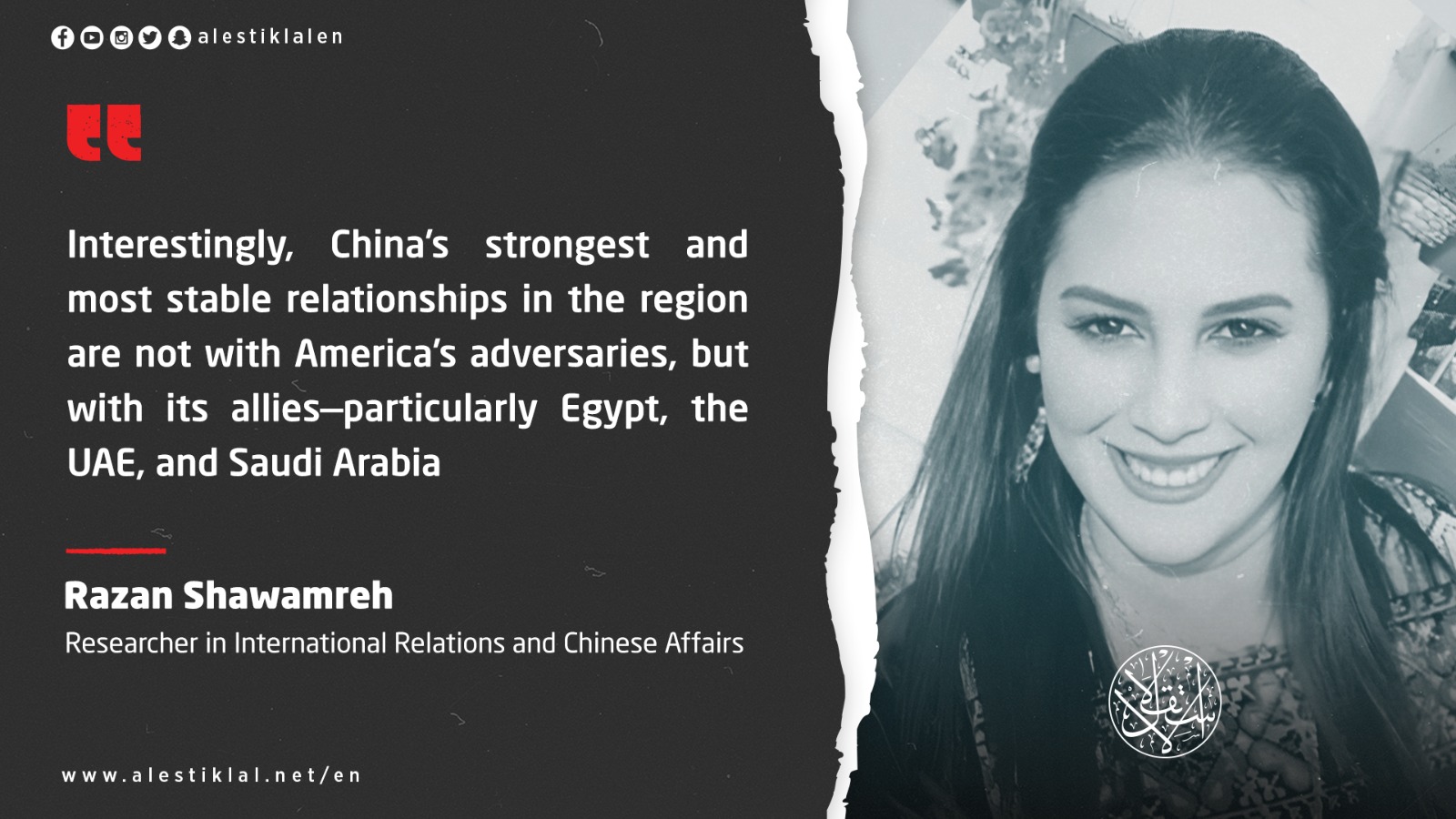
China and the Region’s Flashpoints
Despite its historic ties with the Palestine Liberation Organization (PLO), China has consistently avoided taking a firm stance against Israeli aggression. Why?
To begin with, China’s support for the Palestinian cause needs serious reexamination. Contrary to common belief, historical records indicate that China’s ties with the Zionist movement actually date back to the 1920s. Notably, in 1945, Mordechai Olmert—the father of former Israeli Prime Minister Ehud Olmert—reportedly sought and received military assistance from Chinese officials by 1948. This raises a serious and overlooked question: Did China play a role in the 1948 Nakba?
When compared to its support for Zionism, China’s backing of Palestine appears far more limited—a brief moment in its foreign policy rather than the consistent commitment often portrayed in Arab and Western scholarship, or in Israeli narratives today.
China’s support for the PLO and other national liberation movements peaked during the 1960s, within the context of the Cold War. But this support waned by the early 1970s, as China began opening up to the West, particularly the United States, under Washington’s "Open Door" policy and Beijing’s own efforts to end its global isolation. It was during this period that China quietly began building ties with Israel.
In fact, in the 1970s, China voted against the Arab proposal to expel Israel from the United Nations—challenging the widely held belief that China’s normalization with Israel was a consequence of Arab-Israeli normalization or the Oslo Accords. The record shows that Beijing’s diplomatic shift toward Tel Aviv began long before that.
How Beijing Views the Palestinian Resistance: Legitimate Liberation Movements or Extremists, as Framed by the West?
Since the 1980s, China’s official discourse has increasingly dropped language about supporting armed liberation struggles. Instead, it has embraced rhetoric about 'addressing Israel’s security concerns' and 'backing the international consensus' on a two-state solution.
This shift has shaped its stance on Palestinian Resistance. In 2001, for instance, China condemned a Palestinian martyrdom operation near an Israeli Occupation settlement in the West Bank, calling it “an aggressive attack.” And in 2003, Beijing urged then-Palestinian President Yasser Arafat to act against “extremist elements”—a reference to Palestinian resistance fighters—without acknowledging that the West Bank was (and remains) under Israeli occupation.
During major Israeli wars on Gaza, such as in 2012, China took a so-called “balanced” approach, condemning “violence and terrorism” in general terms. But this neutrality created a false equivalence—treating Israeli Occupation attacks and Palestinian Resistance as morally and legally equal, and obscuring the reality of occupation versus resistance.
The current genocide on Gaza has made this pattern even clearer. Following the events of October 7, 2024, China’s response mirrored that of the West and Israel. In an article published after attending a Holocaust memorial in Occupied Jerusalem, Chinese Ambassador Xiao Junzheng described the Hamas-led attack as a global shock, saying the October 7 attacks shook the world and China strongly condemns all acts of violence against civilians and violations of international humanitarian law, including what appeared to be a ‘violent assault’ by Hamas on ‘Israeli civilians.’
He also said that at the same time, the world must ask why this violence continues. The two-state solution remains the only effective path to break the cycle of bloodshed between Israel and Palestine.
By placing the October 7 events in the context of the Holocaust and echoing Western narratives, China reaffirmed its reluctance to confront Israel directly—even amid its genocide on Gaza.
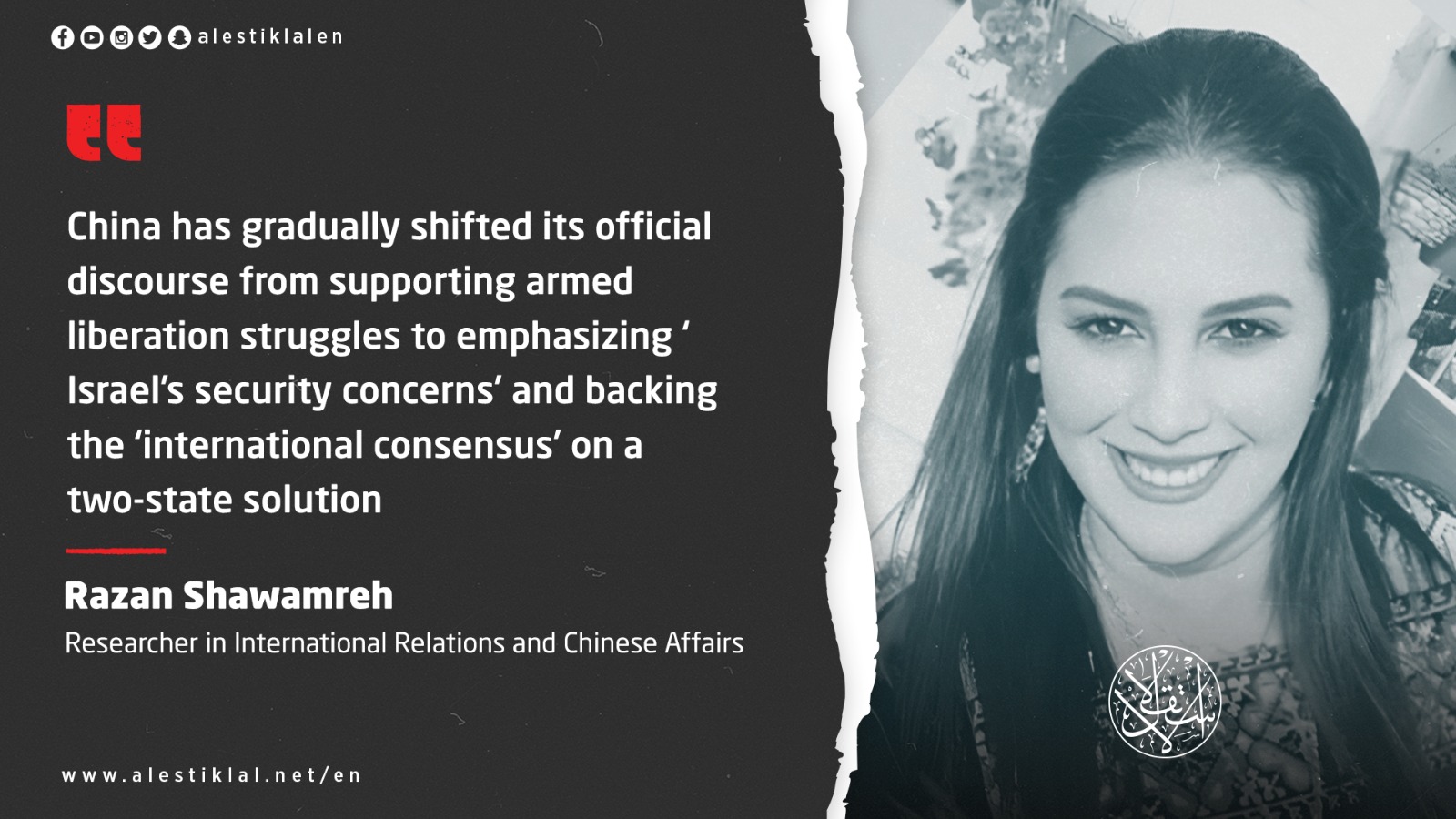
China, Iran, and the U.S.
Would you say China is distancing itself from the chaos that engulfs the U.S., or is it simply focused on investing in stability?
Why would Beijing intervene to stop a war that is draining Washington? It is in China’s interest for the United States to remain bogged down in Middle Eastern wars.
This gives China relative space to focus on its own rise — and second, it’s a war in which Washington’s legitimacy is eroding. For Beijing, this is a favorable war.
Alongside the China of the United Nations, whose role doesn’t go beyond calling on others to “act” to stop the war, there is another China — one not so different from the United States, and at times even surpassing it.
In terms of “surpassing,” the latest UN report published in May 2025 showed that China is now Israel’s largest trading partner, with trade reaching $19 billion — $10 billion more than the closest country, which is Israel’s traditional ally: the United States.
So, during the genocide and the starvation of Gaza’s people, China was feeding the war criminals, exporting goods, and strengthening the Israeli economy.
It is as if China is financially compensating Israel for its “statements” at the UN — a compensation far more powerful than symbolic speeches, and far more effective than verbal gestures meant to rally the Global South against U.S. hegemony.
And when it comes to resemblance with the United States: neither China nor Washington has so far used the term genocide to describe Israel’s crimes in Gaza.
Both countries limit themselves to formal criticism of Israeli settlements while continuing to invest in them. Both endorse the Zionist narrative that presents Israel as the legitimate representative of the “Jewish people” and defend its “right to exist,” with no acknowledgment of Israel as a colonial settler project.
While the U.S. continues arming Israel, China remains silent — even avoiding any mention of U.S. military aid to Israel in its official documents. Beijing’s criticism is limited to the U.S. veto at the Security Council.
But this silence goes beyond just avoiding provoking Israel — it reflects growing complicity from the Chinese private sector in the mechanisms of the Israeli Occupation.
Reports have revealed that Chinese drone parts were used in Israel’s past wars and in today’s genocide.
In a recent Israeli Ministry of War tender to purchase 5,000 suicide drones for use in Gaza and the West Bank, the Chinese company HQProp was listed as the sole supplier of propellers, alongside Team Blacksheep in Hong Kong, which supplied communication units.
These are not simple parts — they are essential components that allow drones to strike Palestinians. And there are no restrictions limiting their use against Palestinian civilians.
Another example: DJI, the world’s leading drone manufacturer based in Shenzhen, China, has reportedly had its products used by the Israeli Occupation army in surveillance and military operations during the genocide.
Although DJI claims its drones are not meant for combat, their presence in these contexts contradicts China’s position on a ceasefire, while its companies are clearly complicit in the genocide.
During the 2021 Israeli war on Gaza, Chinese Foreign Ministry spokesperson Hua Chunying criticized Washington, saying: The U.S. has taken a stance that is against the international community.
But today the scene has changed: the U.S. is no longer standing alone — China has joined it, not just in rhetoric but in concrete positions completely at odds with the global consensus.
There have been several moments where China looked just like the U.S. — while some Western states complicit in the genocide shifted their positions, at least rhetorically.
For example, after 18 months of firm support, the United Kingdom summoned the Israeli ambassador and halted negotiations over a free trade deal with Tel Aviv.
In contrast, the Chinese ambassador was busy publishing op-eds reassuring Israeli readers that “China’s development will bring new opportunities for Israel.”
Another example: China’s BRICS partners — Brazil and South Africa — withdrew their ambassadors from Israel and downgraded relations with the Zionist state.
Meanwhile, Beijing merely stated that there are no direct or fundamental conflicts of interest between China and Tel Aviv, and no historical grievances between them.
And French President Emmanuel Macron described Israel’s crimes in Gaza as “disgraceful and shameful,” adding that it’s not for Prime Minister Netanyahu to determine whether this constitutes genocide, that’s for historians to decide.
China, meanwhile, continues to completely avoid using the term “genocide” to describe what’s happening in Gaza, instead referring to it merely as a “humanitarian crisis”—all while continuing to export military components to Israel.
How does China see its relationship with Iran? A strategic partnership or just a pragmatic relationship of convenience?
There is no formal alliance between China and Iran. Beijing has consistently emphasized that its foreign policy is based on “non-interference” and “no alliances.”
China has tried to build strong economic ties with Iran, but those efforts have largely failed due to international sanctions.
For example, in the military sphere, Russia—not China—has been Iran’s largest arms supplier over the past five years. Beijing does not export weapons to Tehran. In fact, many Chinese energy companies have withdrawn from the Iranian market and pulled their investments.
China is also cautious not to jeopardize its economic relationships with the U.S. and Europe over Iran. It won’t sacrifice those markets for the sake of deeper ties with Tehran.
Why did Iran sour on China’s stance during the Israeli war on Tehran?
China’s position was largely rhetorical, limited to calls for all sides to show restraint. Although it fiercely criticized Israel, Beijing stopped short of taking a confrontational stance.
What is the nature of Chinese military or technical support for Iran? Has Beijing crossed any U.S. red lines?
There is no military support from China to Iran. On the contrary, Beijing has adhered to the imposed sanctions as much as possible in order to avoid provoking the West.
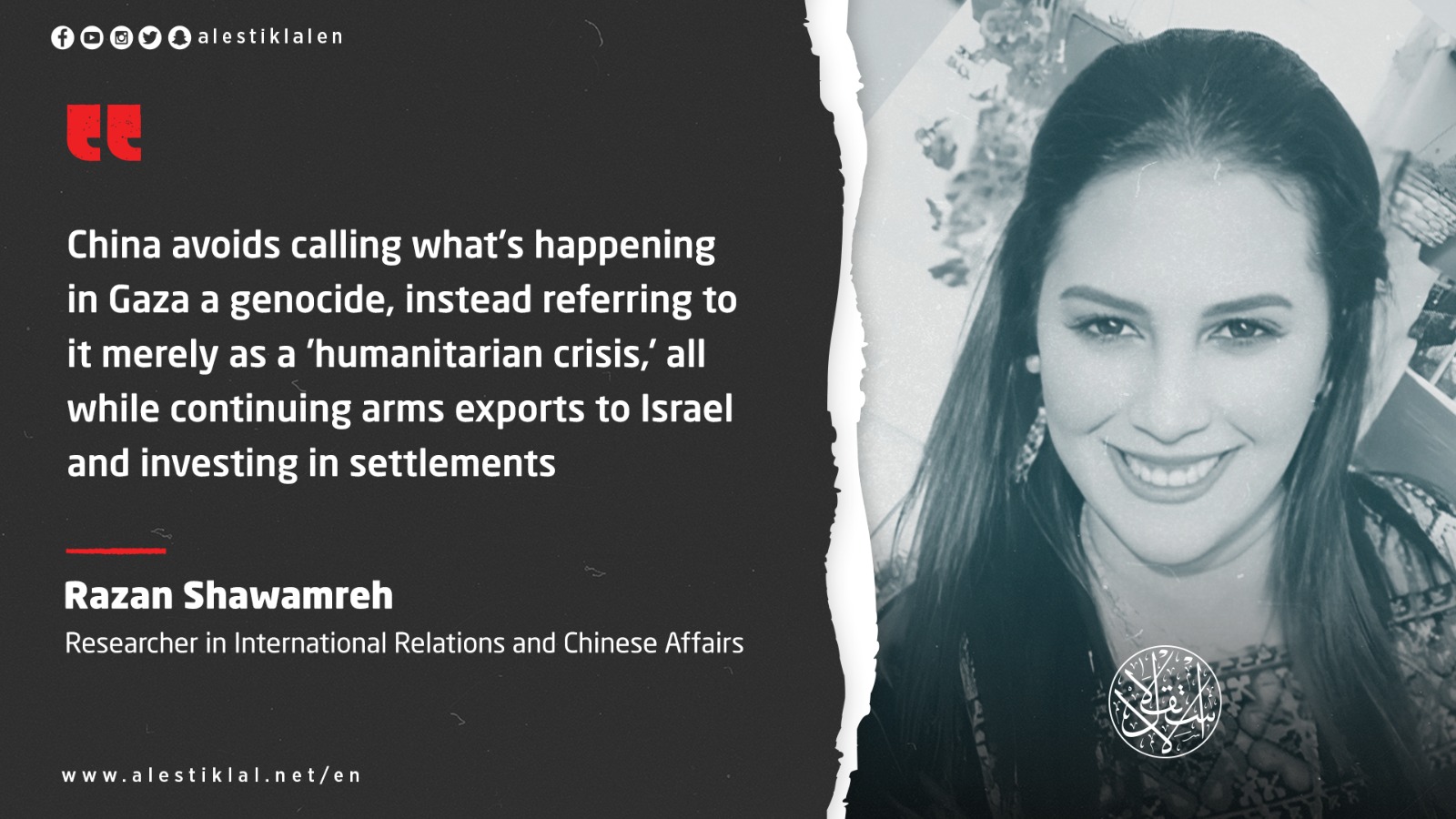
The Economic File
What kind of investments has China made in Israeli settlements? Can economic interests explain Beijing’s reluctance to condemn Israel?
In its rhetoric, China does not call for the removal of Israeli settlements — it limits its criticism to settlement expansion and settler violence.
In 2014, Chinese investment in Israeli settlements began through state-owned companies. For example, Bright Food acquired 56% of Tnuva, a dairy company that sources its raw materials from settlements.
Despite international and Palestinian campaigns against Tnuva, China went ahead and acquired the majority of its shares. What’s even more alarming is that in 2021, Tnuva expanded its operations to include the construction of 22 transportation lines connecting settlements around Occupied Jerusalem to so-called “Israeli cities.”
In other words, China is now investing directly in the Israeli settlement project in Palestine, and can arguably be described as a settlement partner.
China’s state-led involvement in settlements also opened the door for private sector investment.
For instance, in 2016, the private Chinese firm Fosun acquired Ahava, a cosmetics company that had been explicitly named in UN General Assembly reports and targeted by boycott campaigns since 2009. Yet Chinese firms moved forward with the acquisition.
That same year, a Chinese state-owned company acquired Adama, a firm accused of providing the Israeli military with products used to destroy crops in Gaza, and known to operate within settlements.
During the genocide, Adama provided financial support to settlers in the Gaza envelope settlements.
Today, 10 Chinese companies are operating in settlements — two of them are private, while eight are state-owned. So, China as a state doesn’t merely trade with the settlements — it owns assets in them. It has become a settlement partner, or even a new settler itself.
Legally, under international law, this constitutes a serious violation that could amount to a war crime, meaning China could potentially bear legal responsibility alongside Israel.
Is the economy the reason China avoids condemning Israel?
First, in its rhetoric, China condemns “violence by both sides.” So yes, it does condemn Israel — but it doesn’t oppose Israel, and the reason is clear: economy and technology.
What do Palestinians offer China? In contrast, Israel provides advanced technology, and China has acquired Israeli research centers. Israel is also the second country after Russia allowed to establish an independent university campus in China. Israel’s Bank Leumi opened a branch in China to support Israeli Occupation projects within Beijing.









